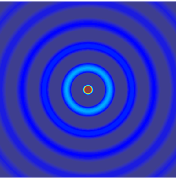Quantum Field Theory
- Introduction to Quantum Mechanics
- Wave-Particle Duality
- The Schrödinger Equation
- Quantum Operators and Measurement
- Quantum Mechanics of Systems
- The Dirac Equation
- Introduction to Quantum Electrodynamics (QED)
- Path Integrals and Quantum Mechanics
- Symmetries in Quantum Field Theory
- Quantum Chromodynamics
- The Higgs Mechanism
- Quantum Field Theory in Curved Space-Time
- Quantum Cosmology and Conclusion
The Dirac Equation
Understanding Wave Equations in Quantum Field Theory

Second-order linear differential equation important in physics.
Wave equations play a crucial role in quantum mechanics, providing a mathematical framework that describes the behavior of quantum systems. This article will introduce you to the concept of wave equations, focusing on the Schrödinger, Klein-Gordon, and Dirac wave equations.
Introduction to Wave Equations
In physics, wave equations are differential equations that describe the propagation of waves. In quantum mechanics, these equations are used to predict the probability distribution of a particle's position at any given time.
The Schrödinger Wave Equation
The Schrödinger equation, named after physicist Erwin Schrödinger, is a fundamental equation in quantum mechanics. It describes how the quantum state of a quantum system changes over time. The equation is essentially a mathematical statement of the principle of wave-particle duality, which states that all particles also have wave characteristics.
The Klein-Gordon Equation
The Klein-Gordon equation is a relativistic wave equation, named after physicists Oskar Klein and Walter Gordon. It was the first attempt to incorporate special relativity into the laws of quantum mechanics. The Klein-Gordon equation describes scalar particles, particles with zero spin, and is used in quantum field theory to describe the behavior of quantum fields.
The Dirac Wave Equation
The Dirac equation, formulated by physicist Paul Dirac, is a relativistic wave equation that provides a description of elementary spin-½ particles, such as electrons, in the context of quantum mechanics. The Dirac equation incorporates the principles of both quantum mechanics and the theory of special relativity, predicting the existence of antimatter and fully accounting for the phenomenon of electron spin.
The Role of Wave Equations in Quantum Mechanics
Wave equations are fundamental to our understanding of the quantum world. They provide a mathematical framework that allows us to predict and describe the behavior of quantum systems. The Schrödinger, Klein-Gordon, and Dirac equations each offer unique insights into the nature of particles and their behavior, contributing to our understanding of quantum mechanics and quantum field theory.
In conclusion, wave equations are a cornerstone of quantum mechanics, providing the mathematical basis for describing the behavior of quantum systems. Understanding these equations is crucial for anyone studying quantum field theory.